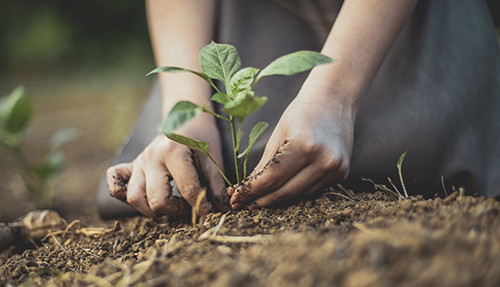Gardening on a Budget
Feb 21, 2022

Even on a generous budget, the supplies needed to get started with your garden can add up. If this is your first year, you will have to have fencing, tools, soil, seeds, and more, not to mention a lot of sweat equity. It may feel overwhelming at first, but we want to help you break down the process into small, actionable steps so that you can confidently jump into this new venture.
Here are four ways to start a garden on a budget without breaking the bank:
1. Start slow and be patient
It’s easy to spend more time and money than anticipated in the early years as you set up the infrastructure of your garden, and it is unlikely that you will grow enough food within the first year to balance this cost. Vegetable gardening tends to have a gradual return on investment, so there is no reason to break the bank and rush into things. Start small and gradually invest your money into development to match the gradually increasing return. As you hone your skills, you will be able to grow more produce each year, but until then, have patience!
2. Save on building materials
Raised garden beds can be a significant investment for first-time gardeners — after all, the price tag on rot-resistant lumber is a nightmare right now! Try building a more budget-friendly bed out of cinderblocks, pallets, rocks, logs, or even galvanized stock tanks. Keep in mind that raised beds take a lot of soil to fill up. Although it will take a year or so, building a composting system and using your own soil will help to save money in the long-run.
3. Choose the right tools
Just because you have a list of tools that you think you’ll need doesn’t mean that these are the tools you’ll actually need. It’s okay to start with cheap tools or ones that you find in your family’s old shed while you get your hands dirty and discover which tools you use most often. As you find more money in your budget, purchase higher quality versions of those tools that will actually give you a good return on investment. A good gardener is always resourceful, so start with what you have already available to you and add to your collection later.
4. Research which vegetables to grow
Not all vegetables are created equal, and some are harder to grow than others. Do your research before you get started and choose low-maintenance, high-yield plants such as squash, tomatoes, peppers, and cucumbers. Save money throughout the year by growing food that can be preserved, such as potatoes, onions, carrots, and peas. Talk to local gardeners or your local extension agent to find out which plants are likely to thrive in your area.
Your local Co-op is here to help you with all of your gardening ventures. We’re your source for the best seeds, supplies, and advice, so give us a call or stop by the store!
For more content like this, check out the latest issue of the Cooperator.
Here are four ways to start a garden on a budget without breaking the bank:
1. Start slow and be patient
It’s easy to spend more time and money than anticipated in the early years as you set up the infrastructure of your garden, and it is unlikely that you will grow enough food within the first year to balance this cost. Vegetable gardening tends to have a gradual return on investment, so there is no reason to break the bank and rush into things. Start small and gradually invest your money into development to match the gradually increasing return. As you hone your skills, you will be able to grow more produce each year, but until then, have patience!
2. Save on building materials
Raised garden beds can be a significant investment for first-time gardeners — after all, the price tag on rot-resistant lumber is a nightmare right now! Try building a more budget-friendly bed out of cinderblocks, pallets, rocks, logs, or even galvanized stock tanks. Keep in mind that raised beds take a lot of soil to fill up. Although it will take a year or so, building a composting system and using your own soil will help to save money in the long-run.
3. Choose the right tools
Just because you have a list of tools that you think you’ll need doesn’t mean that these are the tools you’ll actually need. It’s okay to start with cheap tools or ones that you find in your family’s old shed while you get your hands dirty and discover which tools you use most often. As you find more money in your budget, purchase higher quality versions of those tools that will actually give you a good return on investment. A good gardener is always resourceful, so start with what you have already available to you and add to your collection later.
4. Research which vegetables to grow
Not all vegetables are created equal, and some are harder to grow than others. Do your research before you get started and choose low-maintenance, high-yield plants such as squash, tomatoes, peppers, and cucumbers. Save money throughout the year by growing food that can be preserved, such as potatoes, onions, carrots, and peas. Talk to local gardeners or your local extension agent to find out which plants are likely to thrive in your area.
Your local Co-op is here to help you with all of your gardening ventures. We’re your source for the best seeds, supplies, and advice, so give us a call or stop by the store!
For more content like this, check out the latest issue of the Cooperator.